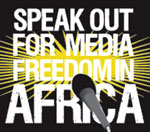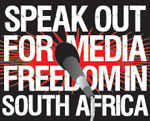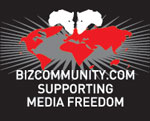

"Our current media freedom is heavily embedded in our political history, and when we got our way through the Constitution we said government would no longer have a say on matters relating to media policy and regulation because we suffered too much," George Sarpong, Ghana's National Media Commission (NMC) executive secretary, told delegates currently attending the Regulations and Rights media conference at Wits University, Johannesburg.
NMC regulates over 120 radio stations and over 40 print publications.
Consequently, the new constitution banned any form of censorship, banned government from getting involved in media policy and regulation and forbid it from interfering in the editorial work of journalists, according to Sarpong.
"As the NMC, our job is to ensure free, responsible and pluralistic views, and insulate media from government control, and settle and mediate complaints against the media."
Contrary to some African countries, such as South Africa, where the state appoints the public broadcaster's board members, the NMC is in charge of these appointments in Ghana. Sarpong also said the NMC's role is to ensure that any state-owned media offers fair and equitable opportunities for the coverage of views, including views from the opposition. This is totally contrary to Africa's 'established norms' of state-owned media always covering government stories in a positive perspective.
But, it seems as if the Ghanaian media's nine-year honeymoon is about to end and the NMC's independence is about to be compromised as various quarters, in particular the government, have been calling for media freedoms to be curtailed for no apparent reasons.
"Please do something about media freedom, it is too much, find a way to cut it," Sarpong said, quoting views from a recent Constitutional Review proposals forum.
The proposals include giving the government rights to appoint NMC members, bringing media policy and regulation under the authority of the minister of information and introducing sanctions for media branches, among others.
"Bad law doesn't create good journalism," Sarpong said, frustrated about the proposals, which if approved, will be seen as an attempt by the government to wrestle media policy and regulation from the industry and hamper freedom of expression.
In response to these proposals, Sarpong suggested a media monitoring model, which he said, will monitor media performance on all key variables of ethics, including balance and accuracy, hate speech and 'dangerous' reporting.
Nigeria's Maxwell Kadiri, of the Open Society Justice Initiative's Africa programme, said: "We are not giving up the battle, we have come a long way, and we cannot afford to fail now."
ustice Kate O'Regan, former SA's Constitutional Court judge, said: "We must protect freedom of expression at all costs because it enhances the quality of reporting."
The two-day conference, which focuses on the roles and responsibilities of the media in Africa, aims at creating a continental perspective, fostering and exchanging knowledge and strategies on issues affecting the media in Africa. The conference ends today.

Last updated at 11.04 on 16 March 2011.
